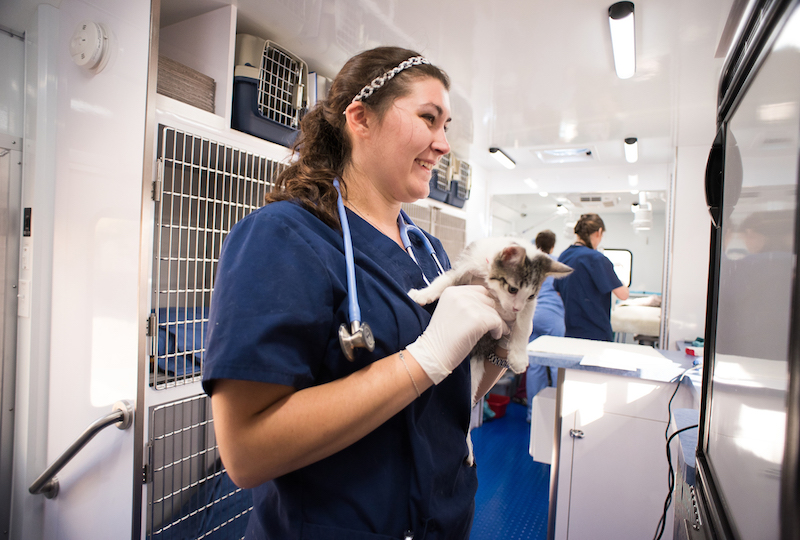CPV is a deadly gastrointestinal disease that affects unvaccinated, insufficiently vaccinated, and improperly vaccinated dogs. CPV infected animals are a challenge for shelters and private practice veterinarians.
The proposed consent agreement resolves the Commission’s allegations that the Acquisition, if consummated, would substantially lessen competition in markets for specialty and emergency veterinary services.
Diagnosis
Our highly-skilled staff has multi-pronged diagnostic capabilities, allowing them to quickly determine the source of your pet’s illness or injury. Whether it’s radiology, ultrasound, or parasite screening, our animal hospital has the tools to help you.
Frequently, animals ingest material that they shouldn’t and end up with “foreign objects” in their stomachs. After a thorough evaluation, our Emergency Vets in Austin TX may recommend endoscopic foreign object removal to clear your pet’s stomach of these unwanted materials.
Save on veterinary costs for routine care by investing in pet insurance today! Pawlicy Advisor’s free marketplace can help you compare quotes from top providers. Get reimbursed up to 90% for unexpected accidents and illnesses. Also, take advantage of treatment financing solutions like CareCredit. Learn more. Our 24-hour veterinary hospital is ready to care for your pets when you need it most.
Treatment
Austin Veterinary Emergency and Specialty provides complete care for animals in need of emergency services or specialized treatment. Their experienced staff and state-of-the-art facility ensure your pet receives the highest quality of care. They also offer pet insurance that reimburses for unexpected vet costs like accidents and illnesses.
One common emergency they treat is pets that ingest antifreeze. The sweet taste of this chemical causes pets to ingest more than they can handle. This can lead to internal damage, which is why you need to take your pet in for treatment immediately if they are panting heavily and foaming at the mouth. Other symptoms include dark gums and extreme thirst. They can administer blood component therapy to help save your pet’s life. They also perform endoscopic foreign object removal, which is performed under general anesthesia with a fiber-optic camera to examine the inside of your pet’s stomach and esophagus for any foreign material.
Surgery
We offer a wide variety of surgical procedures including soft tissue surgery, neurosurgery and orthopedic surgery by some of the nation’s leading surgeons. During your pet’s surgery, our highly trained technical staff will monitor your pet carefully for a safe and successful outcome.
Blood Component Therapy
Our veterinary hospital has a state-of-the-art blood bank and offers packed red blood cell, whole blood, and plasma transfusions. These life-saving treatments are often administered during emergency situations to stabilize patients until they can be transferred to their family veterinarian for continued care.
Many pets accidentally ingest foreign material into their stomach and esophagus, which requires general anesthesia for the endoscopic removal of these items. During your animal’s emergency appointment, we will evaluate their eligibility for this treatment and discuss options.
Blood Component Therapy
We offer a wide range of blood components including red cell concentrates, fresh frozen plasma and platelet concentrates. All patients are monitored by our emergency veterinarian and highly skilled technical staff throughout the transfusion process.
The demand for blood components outpaces the supply. Therefore, it is important that physicians understand the indications for blood component therapy to minimise unnecessary blood transfusion and reduce hospital costs.
This study assessed the knowledge level of blood component therapy by physician participants at two tertiary health care centres. Findings suggest that the majority of physicians rely on undergraduate training for their knowledge of blood component therapy, and this may not be enough to ensure standard medical practice. Knowledge of the indications for blood component therapy could be improved through the development of clinical practice guidelines and through ongoing educational programs.
Endoscopic Foreign Object Removal
While 80-90% of foreign bodies pass on their own, 10-20% require an endoscopic procedure to evaluate and remove them. This prevents complications such as esophageal rupture, choking, and obstructed passage through the gastrointestinal tract.
This procedure involves sedating your dog, and inserting an endoscope into the mouth and esophagus. Then, doctors use a variety of tools to procure the foreign object.
Sharp objects such as ice picks and razor blades pose a greater risk of mucosal injury. To mitigate this, expert endoscopists orient the sharp edge with the point trailing during extraction and use a latex protector hood or overtube in esophageal and gastric lengths.
